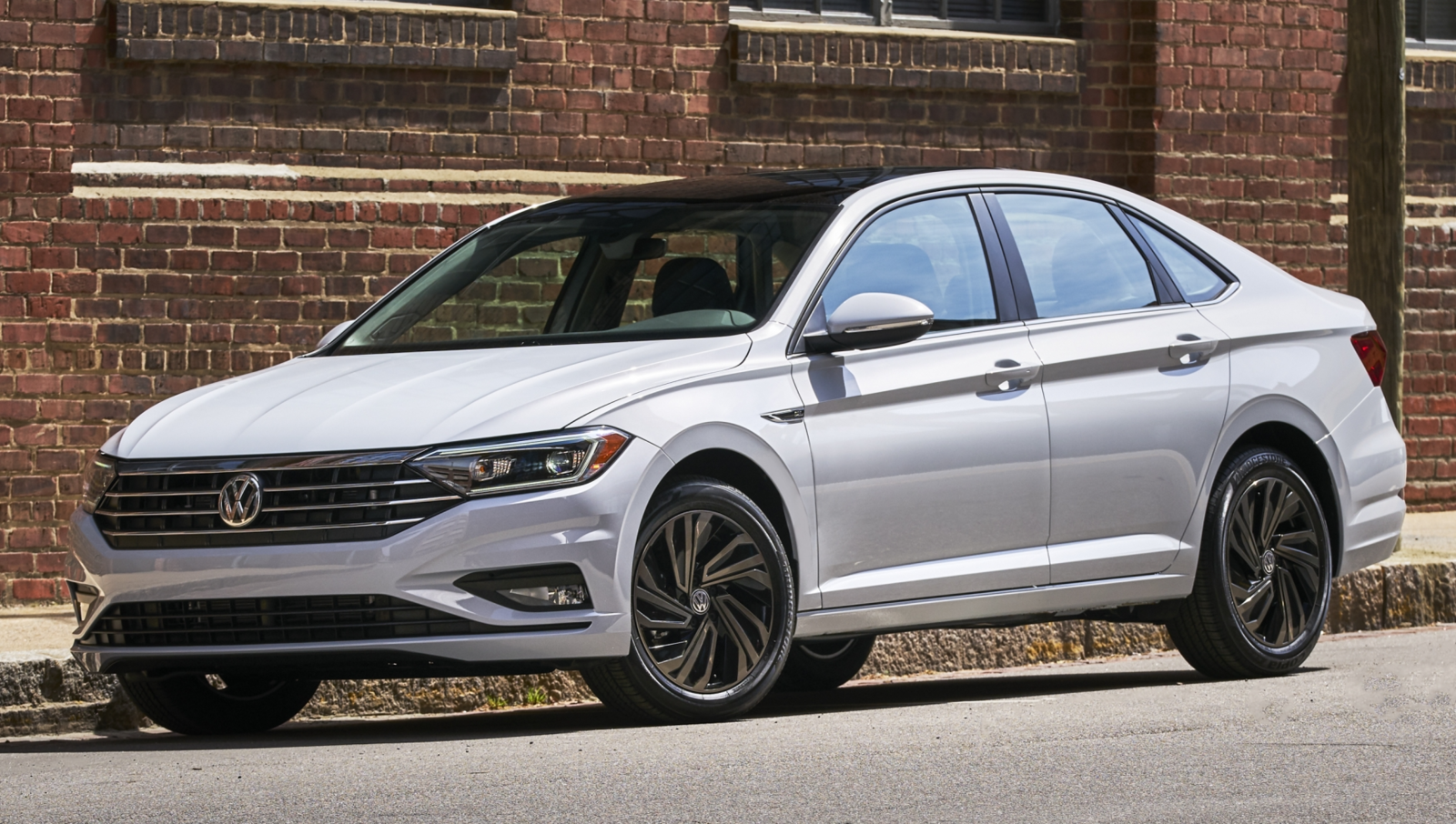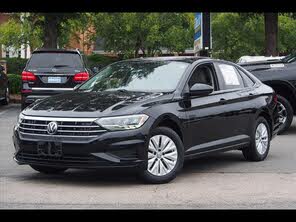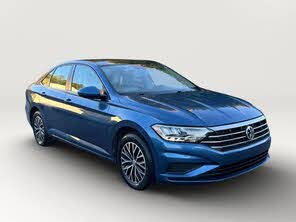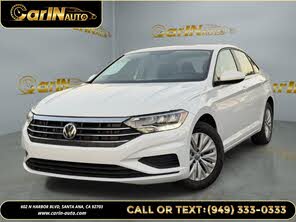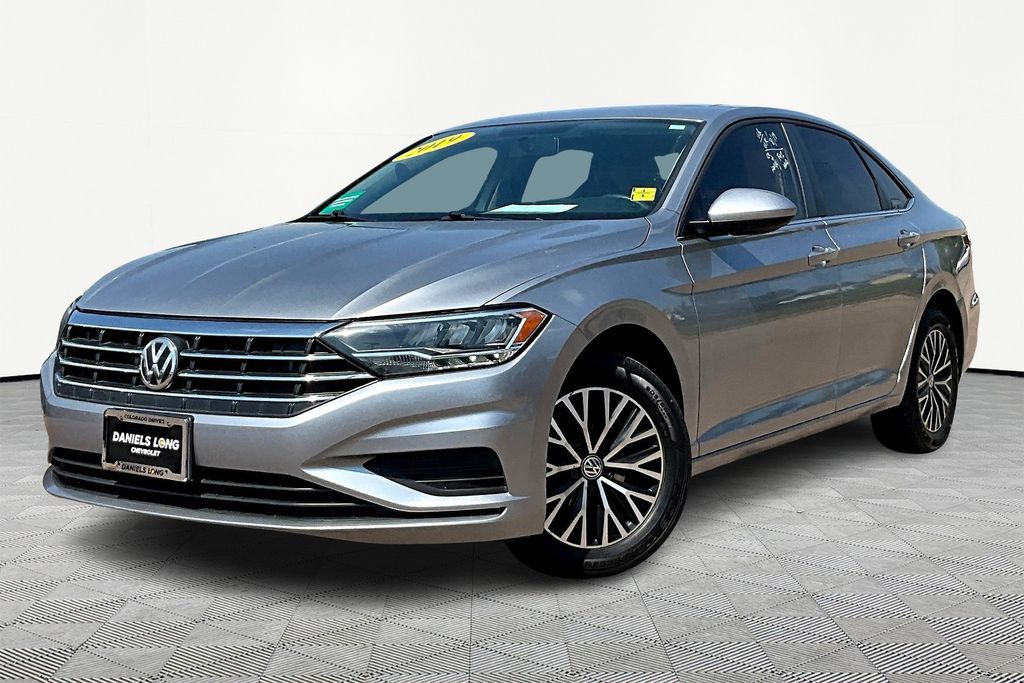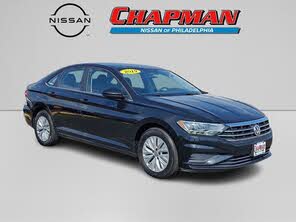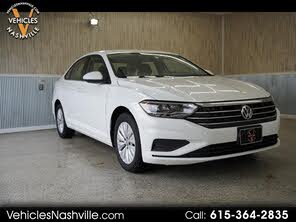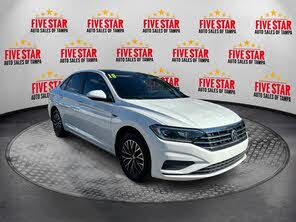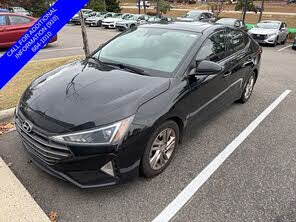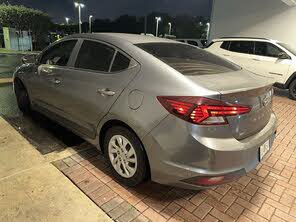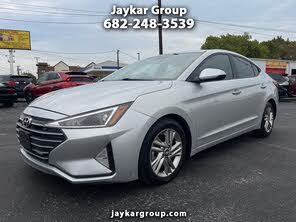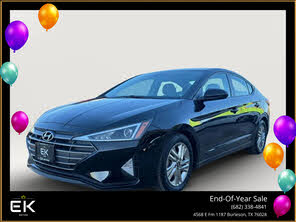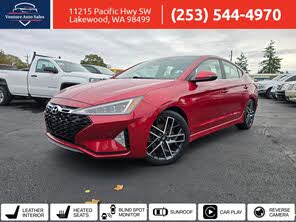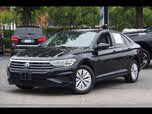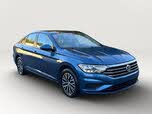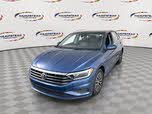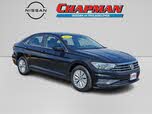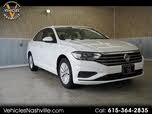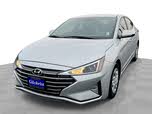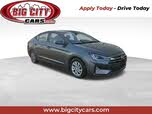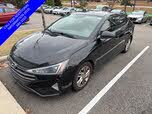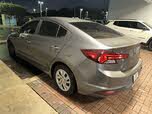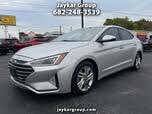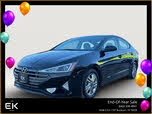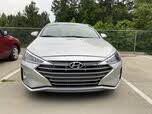2019 Volkswagen Jetta vs 2019 Hyundai Elantra
Overview | |
MSRP$18,745 | MSRP$17,200 |
Listings1090 | Listings739 |
Ratings & Reviews | |
User Reviews | User Reviews |
Expert reviews8.2 out of 10 | Expert reviews8.2 out of 10 |
Pros
Cons
| |
2019 Volkswagen Jetta Reviews SummarySmall cars aren't asked to do much beyond the basics: provide efficient, reliable transportation at a manageable price. Plenty of models fit this form, and in some rare cases, they manage to do it while also being fun to drive, like the Mazda3. In other cases, the vehicle manages to feel more upscale than the competition, like the Honda Civic. But the Volkswagen Jetta's legacy has historically been defined by its ability to offer both an upscale interior and a rewarding driving experience. But then something happened with the Jetta. Starting with the 2011 model year, Volkswagen attempted to broaden the Jetta's appeal, and until 2018 we were left with a drab interior, an underpowered engine, and an uninspiring driving experience. VW’s hallmark was always that its cars felt a little special, so by adopting a homogenous look and feel, VW removed what made the Jetta unique and desirable to its fans. So Volkswagen had some work to do with the new seventh-generation 2019 Jetta. Will this new car move the Jetta name back toward driving refinement and upscale feel? Or will it continue to disappoint as just another bland entrant among small cars? | |
2019 Hyundai Elantra Reviews SummaryCustomer satisfaction is dependent on multiple factors. For example, let's say you go out to a new restaurant. Even if the service is great, or the bill is inexpensive, or the restaurant has a lovely ambiance, you probably won't go back if the food doesn't taste good. The updated and upgraded 2019 Hyundai Elantra is like that—unless you buy the turbocharged Sport trim. | |
Popular Features & Specs | |
Engine1.4L 147 hp I4 | Engine2.0L 147 hp I4 |
Drive TrainFWD | Drive TrainFWD |
Seating Capacity5 | Seating Capacity5 |
Horsepower147 hp @ 5000 rpm | Horsepower147 hp @ 6200 rpm |
MPG City30 | MPG City26 |
MPG Highway40 | MPG Highway36 |
Engine | |
Engine Name1.4L 147 hp I4 | Engine Name2.0L 147 hp I4 |
Torque184 lb-ft @ 1400 rpm | Torque132 lb-ft @ 4500 rpm |
Horsepower147 hp @ 5000 rpm | Horsepower147 hp @ 6200 rpm |
DrivetrainFWD | DrivetrainFWD |
Fuel Economy | |
MPG City30 | MPG City26 |
MPG Highway40 | MPG Highway36 |
Interior | |
Seating Capacity5 | Seating Capacity5 |
Safety | |
Front Crash Overall4 | Front Crash Overall4 |
Side Crash Overall5 | Side Crash Overall4 |
Dimensions & Capacity | |
Cargo Space14.1 cu ft | Cargo Space14.4 cu ft |
Curb Weight2959 lbs | Curb Weight2972 lbs |
Height57.4 in | Height56.5 in |
Length185.1 in | Length181.9 in |
Width70.8 in | Width70.9 in |
Wheelbase105.7 in | Wheelbase106.3 in |
Maximum Payload970 lbs | Maximum Payload |
Number of doors4 | Number of doors4 |
Overview | ||
MSRP | $18,745 | $17,200 |
Listings | ||
Ratings & Reviews | ||
User reviews | ||
Expert reviews | 8.2 out of 10Read full review | 8.2 out of 10Read full review |
Pros & cons | Pros
Cons
| |
Summary | Small cars aren't asked to do much beyond the basics: provide efficient, reliable transportation at a manageable price. Plenty of models fit this form, and in some rare cases, they manage to do it while also being fun to drive, like the Mazda3. In other cases, the vehicle manages to feel more upscale than the competition, like the Honda Civic. But the Volkswagen Jetta's legacy has historically been defined by its ability to offer both an upscale interior and a rewarding driving experience. But then something happened with the Jetta. Starting with the 2011 model year, Volkswagen attempted to broaden the Jetta's appeal, and until 2018 we were left with a drab interior, an underpowered engine, and an uninspiring driving experience. VW’s hallmark was always that its cars felt a little special, so by adopting a homogenous look and feel, VW removed what made the Jetta unique and desirable to its fans. So Volkswagen had some work to do with the new seventh-generation 2019 Jetta. Will this new car move the Jetta name back toward driving refinement and upscale feel? Or will it continue to disappoint as just another bland entrant among small cars? | Customer satisfaction is dependent on multiple factors. For example, let's say you go out to a new restaurant. Even if the service is great, or the bill is inexpensive, or the restaurant has a lovely ambiance, you probably won't go back if the food doesn't taste good. The updated and upgraded 2019 Hyundai Elantra is like that—unless you buy the turbocharged Sport trim. |
Video | ||
Popular Features & Specs | ||
Engine | 1.4L 147 hp I4 | 2.0L 147 hp I4 |
Drive Train | FWD | FWD |
Seating Capacity | 5 | 5 |
Horsepower | 147 hp @ 5000 rpm | 147 hp @ 6200 rpm |
MPG City | 30 | 26 |
MPG Highway | 40 | 36 |
Engine | ||
Engine Name | 1.4L 147 hp I4 | 2.0L 147 hp I4 |
Torque | 184 lb-ft @ 1400 rpm | 132 lb-ft @ 4500 rpm |
Horsepower | 147 hp @ 5000 rpm | 147 hp @ 6200 rpm |
Drivetrain | FWD | FWD |
Fuel Economy | ||
MPG City | 30 | 26 |
MPG Highway | 40 | 36 |
Interior | ||
Seating Capacity | 5 | 5 |
Safety | ||
Front Crash Overall | 4 | 4 |
Side Crash Overall | 5 | 4 |
Dimensions & Capacity | ||
Cargo Space | 14.1 cu ft | 14.4 cu ft |
Curb Weight | 2959 lbs | 2972 lbs |
Height | 57.4 in | 56.5 in |
Length | 185.1 in | 181.9 in |
Width | 70.8 in | 70.9 in |
Wheelbase | 105.7 in | 106.3 in |
Maximum Payload | 970 lbs | |
Number of doors | 4 | 4 |
The 2019 Volkswagen Jetta arrived with a slightly elongated body and a longer wheelbase compared to its predecessor, while maintaining the same height and gaining about an inch in width. This subtle increase contributed to a more upscale appearance. With a wide, angular grille inspired by the VW Arteon sport sedan, the new Jetta's look was dramatically different from the previous generation’s design. VW traditionally favored simplicity, but the earlier Jetta’s front end appeared subdued to the point of dullness. The fresh style, albeit a bit much for some due to its pronounced grille, aimed to infuse the Jetta with an upscale aura.
Inside, the cabin matched the exterior's angular design language, integrating it into a spacious and functional interior. The surfaces mixed soft-touch materials to enhance its premium feel, with comfortable seats designed for long-distance travel.
Trim levels for the Jetta included S, SE, R-Line, SEL, and SEL Premium. The base S trim, which VW provided for review, featured 16-inch alloy wheels, LED headlights and tail lights, and a 6.5-inch touchscreen with Volkswagen’s Car-Net App-Connect and standard Apple CarPlay and Android Auto. The SE introduced V-Tex leatherette seating, a panoramic moonroof, 16-inch two-tone wheels, and a variety of advanced driver-assistance features like forward-collision avoidance and blind-spot monitoring. The sportier R-Line added unique styling elements, a specialty steering wheel, fog lights, and Volkswagen's XDS differential for enhanced driving dynamics. The SEL trim included upgraded LED headlights, an 8-inch touchscreen, and the Volkswagen Digital Cockpit. The range-topping SEL Premium offered additional luxury touches like an 8-way power driver’s seat with memory settings and a high-end BeatsAudio system.
In contrast, the 2019 Hyundai Elantra revamp included new styling for the front and rear as well as updated wheels. The revised design drew inspiration from complex geometric patterns, presenting a more intricate look compared to the previous model’s upscale, yet conservative design. While the changes spiced up the Elantra’s exterior, opinions were divided on its appeal.
Inside the Elantra, subtle enhancements improved the overall interior experience. New air vents, enhanced plastic textures, and revised gauges and dashboard controls added excitement to its previously plain cabin. Interior quality was solid, with the shifter particularly feeling robust. Despite some inexpensive-looking materials, the tightly fitted parts conveyed a sense of durability.
The Elantra was available in two body styles: the GT hatchback and the 4-door sedan, sold in SE, SEL, Value Edition, Eco, and Limited trims. The base SE trim started at an affordable $17,100, with the Limited trim, which carried a base price of $23,485, offering features like adaptive cruise control, forward-collision warning with pedestrian detection, navigation, and a premium audio system through the optional Ultimate Package.


















The 2019 Volkswagen Jetta was equipped with a 1.4-liter turbocharged inline 4-cylinder engine across all trims. This powerplant generated 147 horsepower and 184 pound-feet of torque. Although it had 3 fewer horsepower than the previous year's engine, it felt more responsive due to its tuning, which delivered power quickly from a stop. The new 8-speed automatic transmission, replacing the former 6-speed, played a significant role in enhancing acceleration and efficiency. For those preferring manual shifting, a new 6-speed manual transmission also replaced the older 5-speed model.
The Jetta’s performance was well-rounded, handling both city and highway driving with ease. It maintained strong acceleration from a standstill and had enough power for overtaking at higher speeds. The steering balanced smoothness with sportiness, akin to an entry-level BMW 3 Series, with precise cornering and minimal body roll. The ride quality was refined and soft, managing rough roads without feeling floaty. Fuel economy was impressive with both manual and automatic transmissions achieving 30 mpg city, 40 highway, and 34 combined.
The 2019 Hyundai Elantra, aimed at a broader audience, came with a 2.0-liter 4-cylinder engine producing 147 horsepower, paired with a 6-speed automatic transmission. While acceleration was acceptable, the Elantra offered multiple driving modes: Normal, Sport, and Smart. The Smart mode was intended to adapt to the driver’s style, though its effectiveness was questionable. The Sport mode added some liveliness but also increased steering weight, leading most drivers to prefer the Normal mode.
The EPA rated the Elantra at 32 mpg in combined driving. In real-world testing, it returned 29.3 mpg on a specific loop but achieved 32.4 mpg over a week’s testing. Handling was decent, though the Elantra lacked the engaging driving dynamics of some rivals. The ride quality was somewhat compromised due to the torsion-beam rear-axle suspension, making it less rewarding but adequately functional.
The Volkswagen Jetta’s front seats were remarkably comfortable, even on long trips, which was a standout feature among compact cars. Despite a slight reduction in legroom (both front and rear) from the previous model, the interior space remained sufficient. The trunk space decreased from 15.7 to 14.1 cubic feet, still average for the segment. VW improved cabin usability by repositioning the touchscreen above the climate vents and moving the shifter backward, making controls more accessible and increasing the center tray's size.
Overall, the Jetta’s layout favored functionality, blending real buttons and dials with touchscreen functions, ensuring practical and effortless operation for the driver.
The Hyundai Elantra provided good front-seat comfort, with height adjustments for both front seats enhancing accessibility. Most trims featured heated seats, a leather-wrapped steering wheel, and dual-zone automatic climate control. However, backseat comfort lagged behind, with hard plastic seatbacks causing discomfort for taller passengers.
The Elantra offered decent interior storage, with a large center-console bin, a spacious glove box, and sizable door bins. The hands-free Smart Trunk feature, available in most trims, facilitated easier loading by automatically popping open when it detected the key fob nearby. The trunk provided 14.4 cubic feet of space, slightly more than the Jetta, offering a bit more room for cargo.
Volkswagen equipped the Jetta with considerable tech features from the base model upward. The base Jetta came with a 6.5-inch touchscreen featuring Volkswagen’s Car-Net App-Connect, as well as Apple CarPlay and Android Auto. This ensured drivers didn't need to upgrade to higher trims to access navigation, as they could use smartphone apps for that purpose.
Higher trims, like the SEL and SEL Premium, introduced Volkswagen’s Digital Cockpit, a customizable full-color digital display replacing the conventional instrument panel. This 10.25-inch screen could be personalized to show various information and project navigation maps directly onto it, enhancing the driving experience.
The Hyundai Elantra, excluding the base SE trim, provided a 7-inch touchscreen infotainment system with Apple CarPlay, Android Auto, and satellite radio. The Limited trim added an Infinity premium sound system, and the Ultimate Package further upgraded the infotainment with an 8-inch display, navigation, and SiriusXM Data Services.
The Elantra’s system was user-friendly with a balanced mix of knobs and buttons, making it less reliant on screen interaction. The technology was intuitive, and the Limited trim’s Infinity audio system offered excellent sound quality, while the Blue Link services added significant convenience and safety functionalities, enhancing the overall tech experience.
The Volkswagen Jetta included a full complement of airbags, a reversing camera, and a tire pressure monitoring system as standard. An automatic post-collision braking system was also standard across all trims.
Higher trims, starting from SE, added driver-assist features like blind-spot monitoring with rear cross-traffic alert and forward-collision avoidance. The SEL and SEL Premium trims further included adaptive cruise control, lane-keeping assist, and automatic high beams.
The Hyundai Elantra emphasized safety, with most trims offering crucial driver-assistance systems as standard. Starting from the SEL trim, the Elantra included forward-collision warning with automatic emergency braking, lane-departure warning with lane-keeping assist, blind-spot monitoring with rear cross-traffic alert, and a driver-monitoring system. The Limited trim added adaptive cruise control, pedestrian detection, automatic high-beam headlights, and a Safe Exit system, ensuring comprehensive safety coverage.
The Elantra earned top marks from the IIHS, with the exception of an Acceptable rating for LATCH child-seat anchor accessibility. The NHTSA awarded it a 4-star overall rating, with similar marks for frontal and rear-seat side-impact protection.
CarGurus highlights

According to CarGurus experts, the overall rating for the 2019 Volkswagen Jetta is 8.2 out of 10, while the 2019 Hyundai Elantra scores 8.2 out of 10. While both cars earn identical scores, the final recommendation tilts towards the Jetta due to its balanced performance and refined driving experience. In conclusion, while both cars have their strengths, the 2019 Volkswagen Jetta’s harmonious blend of performance, comfort, and advanced technology makes it the more compelling choice for buyers seeking a well-rounded compact sedan.
Choose the 2019 Volkswagen Jetta if:
- You prefer a refined driving experience with balanced performance and comfort.
- You value cutting-edge digital displays like the Volkswagen Digital Cockpit.
- You prioritize a practical interior layout with easy-to-use controls.
Choose the 2019 Hyundai Elantra if:
- You want an extensive suite of advanced safety features across multiple trims.
- You seek a slightly larger trunk space for additional cargo capacity.
- You appreciate a user-friendly infotainment system with good sound quality, especially in the Limited trim.
CarGurus highlights

According to CarGurus experts, the overall rating for the 2019 Volkswagen Jetta is 8.2 out of 10, while the 2019 Hyundai Elantra scores 8.2 out of 10. While both cars earn identical scores, the final recommendation tilts towards the Jetta due to its balanced performance and refined driving experience. In conclusion, while both cars have their strengths, the 2019 Volkswagen Jetta’s harmonious blend of performance, comfort, and advanced technology makes it the more compelling choice for buyers seeking a well-rounded compact sedan.
Choose the 2019 Volkswagen Jetta if:
Shop Now- You prefer a refined driving experience with balanced performance and comfort.
- You value cutting-edge digital displays like the Volkswagen Digital Cockpit.
- You prioritize a practical interior layout with easy-to-use controls.
Choose the 2019 Hyundai Elantra if:
Shop Now- You want an extensive suite of advanced safety features across multiple trims.
- You seek a slightly larger trunk space for additional cargo capacity.
- You appreciate a user-friendly infotainment system with good sound quality, especially in the Limited trim.

By: CarGurus + AI
At CarGurus, our team of experienced automotive writers remain at the heart of our content operation, conducting hands-on car tests and writing insightful guides that are backed by years of industry experience. To complement this, we are harnessing AI to make our content offering more diverse and more helpful to shoppers than ever. To achieve this, our AI systems are based exclusively on CarGurus content, ratings and data, so that what we produce is both unique to CarGurus, and uniquely helpful to car shoppers.
